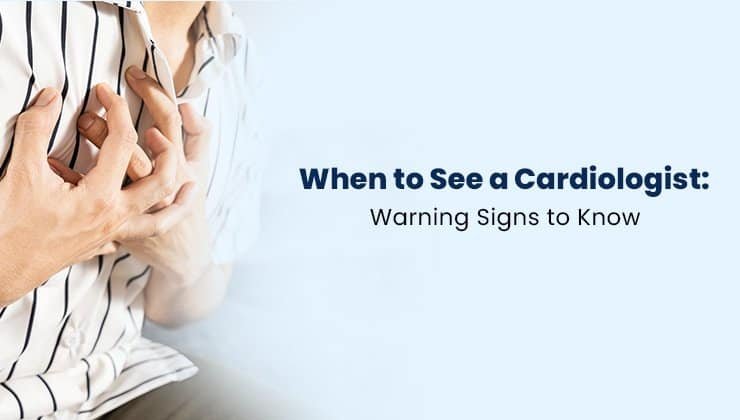Introduction
Heart disease remains the leading cause of death, impacting thousands of lives every year. Often, the symptoms of heart disease are subtle or overlooked. Early detection of the warning signs of heart disease is necessary for long-term heart health.
In this guide, we will explore when you should book a cardiologist consultation, the warning signs to watch for, and how early detection can save lives.
Understanding Heart Disease
Heart disease refers to different conditions that affect the heart and blood vessels, including coronary artery disease, heart failure, arrhythmias, and valvular heart disease. Many heart diseases develop slowly and may remain silent until they lead to severe complications.
Early detection of heart disease is necessary to reduce the risk of complications and improve the quality of life.
Warning Signs To Know When To Consult A Cardiologist
Heart disease may present with various signs and symptoms that can differ among individuals. Some warning signs may be subtle and can often be overlooked. Here are some of the warning signs when to consult a cardiologist:
- Chest Pain or Discomfort
Chest pain is one of the important signs of a potential heart problem. There are other reasons for chest pain that are not related to the heart. However, the chest pain, especially if it feels like pressure, squeezing, tightness, or pain spreading to the arms, back, jaw, or neck, can be a sign of underlying heart disease.
A cardiologist may help in determining the nature of chest pain, distinguish between non-cardiac causes like acidity and cardiac-related discomfort. Diagnostic tests, including ECG, stress test, or angiography, can help in identifying the cause and treatment.
- Shortness of Breath
Difficulty in breathing, even at rest or during minimal exertion, may indicate an underlying heart problem. It can be a symptom of heart failure, during which the heart loses its ability to circulate blood, or other issues, including valve disorders or pulmonary hypertension.
A cardiologist may perform a 2D or BNP blood test to assess heart function and detect fluid buildup in the heart.
- Dizziness, Lightheadedness, or Fainting
Frequent episodes of dizziness, lightheadedness, or fainting can be warning signs of an underlying heart condition. It may indicate an arrhythmia, low blood flow, or a blockage in the arteries. If left untreated, it may lead to severe cardiac events.
A cardiologist may perform necessary tests to determine whether these symptoms are related to the heart.
- Irregular Heartbeats
A racing or fluttering heart can be harmless. However, if it happens frequently, lasts more than a few seconds or is accompanied by symptoms, including dizziness or fainting, it may signal an underlying heart condition. It may indicate arrhythmia, atrial fibrillation or electrolyte imbalances.
A cardiologist may perform an ECG or a Holter monitor test to determine the heart’s rhythm and guide further treatment if required.
- High Blood Pressure
Uncontrolled high blood pressure may cause significant harm to vital organs and increase the risk of stroke, heart attack, or aneurysms if left unchecked.
If blood pressure remains over 140/90 mmHg despite medication and lifestyle changes, it may indicate an underlying heart disease, renal artery stenosis, or hormonal imbalance affecting blood pressure. A visit to a cardiologist may help in detecting high blood pressure.
- Swelling in the Legs, Ankles, or Feet
Persistent swelling in the legs, ankles, or feet, known as peripheral edema, can be an early sign of heart failure, particularly when the heart struggles to pump blood efficiently. However, swelling can also result from other conditions, including kidney disease, liver issues, or venous insufficiency.
A cardiologist may recommend an ECG or blood test to determine the underlying cause and suggest the appropriate treatment.
- Family History of Heart Disease
A history of heart disease in the family, especially if your parents, siblings, or close relatives suffered from heart attacks, strokes, or sudden cardiac arrest, it
may increase your risk of developing cardiovascular problems.
If you have a family history of heart disease, it is recommended that you have regular check-ups with a cardiologist to undergo preventive screenings and detect and manage potential issues.
- High Cholesterol or Triglycerides
Elevated levels of cholesterol may lead to the buildup of plaque, a condition known as atherosclerosis, which in turn may increase the risk of heart attack, stroke, and other cardiovascular diseases.
A cardiologist may help to evaluate the lipid levels through blood tests, assess your overall cardiovascular risk, and recommend appropriate treatment options.
- Diabetes
High blood sugar levels may damage the blood vessels and may contribute to conditions, including coronary artery disease, heart failure, and stroke. So, regular heart checkups are essential for diabetic patients.
A cardiologist may help assess heart health, recommend preventive strategies, and recommend care to reduce complications.
- History of Smoking
Smoking may result in serious heart-related illnesses, including increased blood pressure, clogged arteries, and reduced oxygen supply to the heart. Regular visits to a cardiologist may help in evaluating the damage done and offer steps for managing smoking-related risks.
- Vigorous Exercise
Symptoms, including chest pain, shortness of breath, dizziness, or palpitations during or after vigorous exercise, should not be ignored. It is recommended to consult a cardiologist if you experience these symptoms. They may perform appropriate evaluations, including stress tests, to ensure that the heart is healthy for intense physical activity.
What Happens When You See A Cardiologist?
During your first visit, a cardiologist will
- Take a detailed medical and family history, including symptoms
- Perform a physical examination and track blood pressure, blood sugar, and other metrics.
- Conduct necessary tests, including ECG, Echo, TMT, and blood tests
- Recommend necessary lifestyle changes or treatment options
This comprehensive evaluation may help to identify any existing or potential heart issues and guide appropriate management.
How To Prepare Before Seeing A Cardiologist?
A few steps that can help you prepare before seeing a cardiologist include:
- Write down all your symptoms, even if they are mild or unrelated
- Make a list of all medications and supplements that you are currently taking, including dosages.
- Bring previous test reports or test results, including ECGs, blood tests, or imaging reports
- Be honest about different lifestyle habits, including smoking, alcohol, diet, and stress levels
Being thorough and transparent may help the cardiologist make an accurate diagnosis and recommend the most effective treatment plan.
Why Choose Heart360 Care?
Heart 360Care provides comprehensive cardiac care, offering a wide range of services to help patients maintain optimal heart health.
Here are the reasons that make Heart360 Care stand out:
- Board-certified cardiologists led by Dr Nikhil P J Thekumparampil with years of experience
- Advanced diagnostic and imaging technology
- Comprehensive cardiac care
- Patient-centric approach
Whether you need diagnostic testing, treatment or supportive care, Heart360 Care will help in achieving better heart health.
Conclusion
Heart conditions often present subtle signs, including chest pain, shortness of breath, or a family history of heart disease. Recognising those warning signs of heart disease and seeking immediate medical attention is required to prevent severe complications and support long-term health outcomes.
If you are experiencing any symptoms of heart disease, consider reaching out to Heart 360 Care and book a consultation with Dr Nikhil P.J. Thekumparampil to provide expert cardiovascular care tailored to your individual needs.
Frequently Asked Questions
Yes, young people may also experience heart issues due to congenital defects, arrhythmias, or lifestyle-related risks, including obesity, smoking, and stress. Young adults need to be aware of the early signs of heart disease, including chest pain, shortness of breath, irregular heartbeat, fatigue, or swelling in the legs, ankles, or feet.
No, chest pain is not always related to heart issues. It may also be caused by conditions, including acid reflux (GERD), muscle strain, anxiety, or lung-related issues. The chest pain associated with the heart often feels like pressure, tightness, or squeezing that may radiate to the arm, jaw, back, or neck.
The risk of heart disease may be prevented by adopting a heart-healthy lifestyle, including eating a balanced diet, engaging in regular physical activity, managing stress, quitting smoking, and limiting alcohol consumption. Regular check-ups and adherence to medicines to control underlying blood pressure, cholesterol, and blood sugar are essential in preventing cardiovascular complications.
The frequency of visiting a cardiologist depends on age, risk factors, and a history of heart disease. If you are over 40, have a family history of heart conditions, or have risk factors, regular check-ups are recommended. You should see a cardiologist if you have persistent or severe symptoms, including chest discomfort, shortness of breath, fatigue, or palpitations.









